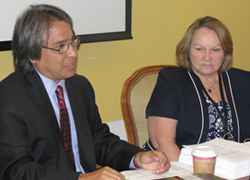The Closing Plenary of the American Society of International Law’s 2012 Annual Meeting featured a conversation between UN Special Rapporteur on Indigenous Issues, Mr. S. James Anaya, and Ms. Dinah Shelton, Chair, Inter-American Commission on Human Rights, and OAS Special Rapporteur on Indigenous Rights. Professor Shelton gave the Nanda Center’s 2011 Myres S. McDougal Distinguished Lecture in International Law. The talk covered many topics and can be accessed here for $9.95. What follows is a brief summary of their conversation.

While quite a few issues were discussed, of particular interest was a discussion on how the United Nations and the Organization of American States work together to coordinate on issues. This is done informally, primarily through the personal relationship between Mr. Anaya and Ms. Shelton, and both thought that some kind of institutional structure would be good. There are a growing number of multiple or duplicate filings and some procedures are being put in place to address the issue.
Mr. Anaya talked about the numerous laws regarding indigenous peoples being promulgated in Latin America. Because these are not in English, they are not getting the widespread attention that might be of interest and the University of Arizona is now translating them so they get more recognition.
Mr. Anaya was concerned that “the community” has developed individuals and organizations that are experts at filing complaints, but not as good at getting results or knowing how to describe what they desire as an outcome. This was relevant to both the number of complaints being filed, and the legislation being developed in Latin America, as exemplified in the current problems with Peru’s new law regarding indigenous rights.
A short, but very important discussion between Mr. Anaya and Ms. Shelton concerned how the UN Declaration on the Rights of Indigenous Peoples (UNDRIP) has influenced the interpretation of treaties such as CERD, CEDAW, Rights of the Child, and even ECOSOC – acknowledging community rights for indigenous peoples despite the historic interpretation of these rights as being individual rights. Mr. Anaya and Ms. Shelton said that international treaties needed to be interpreted in an international context, and that the passage of the UNDRIP by 144 countries, followed by endorsement of the four countries that voted against it, Australia, New Zealand, Canada, and the United States, provided an appropriate context for interpreting the rights of indigenous peoples.
When asked about “pressing issues,” Mr. Anaya focused on the extractive industries and said that indigenous rights should be defined first, and then indigenous peoples should be allowed to develop/control their own resources. He mentioned the Kanaki nickel mine being run with a Canadian company. He also mentioned the ongoing racism experienced by indigenous peoples, and general lack of understanding by most countries about indigenous issues (he is “constantly amazed at the comments of high level ministers…”). He also talked about the levels of sexual violence against indigenous women. Ms. Shelton focused on the women’s issue, and the lack of political will in governments to try to stop the violence, and also to continually characterize the recognition of indigenous rights as being in conflict with the goals of development and poverty reduction.
The last question was raised by Harvard Professor, Steve Marks, who asked about the WIPO and Biocolonialism. This drew comments from Mr. Anaya and Ms. Shelton concerning what a common, recurring issue this is, and about issues of compensation, appropriation, and appropriate use, the involvement of the loss of language, and the effect of climate change on the loss of resources.
This was an amazing end to a wonderful conference. And, as Mr. Anaya commented after the presentation, it was so nice to see indigenous issues presented in a plenary session. He was most gratified at the recognition of indigenous issues that this represented, as were all of us who work on indigenous issues.


